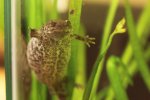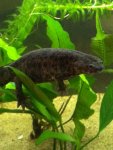firedreams
2010 Research Grant Donor
- Joined
- May 31, 2009
- Messages
- 243
- Reaction score
- 7
- Points
- 0
- Location
- Toronto, ON
- Country
- Canada
- Display Name
- Lydia
Hi all,
I have been raising a P. Waltl larva since August, and am concerned that there is something wrong with him. Specifically, his abdomen is extremely distended (he looks as though he swallowed a grape).
Some background information: This particular larva was always on the fat side. He came from a batch of 12 eggs, and ate all of his siblings. While he has always looked chubby, as he's approached morphing over the last 6 weeks or so, he has appeared to gain even more weight. I stopped feeding him approximately 1 month ago in the hopes that he would lose the weight (originally he was self feeding on white worms, so its certainly possibly that he over-indulged quite a bit). Rather than loosing weight, he appears as fat as ever, and perhaps fatter. Now that he has pretty much completed morphing, I am becoming increasingly concerned that this isn't just a matter of a fat newt, but that there's something more going on here.
For the record, he is able to submerge without difficulty, there is no swelling to his limbs or face, and he has a healthy appetite. However, he does roll a bit from side to side when he swims.
Any suggestions? I have attached some pictures.
I have been raising a P. Waltl larva since August, and am concerned that there is something wrong with him. Specifically, his abdomen is extremely distended (he looks as though he swallowed a grape).
Some background information: This particular larva was always on the fat side. He came from a batch of 12 eggs, and ate all of his siblings. While he has always looked chubby, as he's approached morphing over the last 6 weeks or so, he has appeared to gain even more weight. I stopped feeding him approximately 1 month ago in the hopes that he would lose the weight (originally he was self feeding on white worms, so its certainly possibly that he over-indulged quite a bit). Rather than loosing weight, he appears as fat as ever, and perhaps fatter. Now that he has pretty much completed morphing, I am becoming increasingly concerned that this isn't just a matter of a fat newt, but that there's something more going on here.
For the record, he is able to submerge without difficulty, there is no swelling to his limbs or face, and he has a healthy appetite. However, he does roll a bit from side to side when he swims.
Any suggestions? I have attached some pictures.





